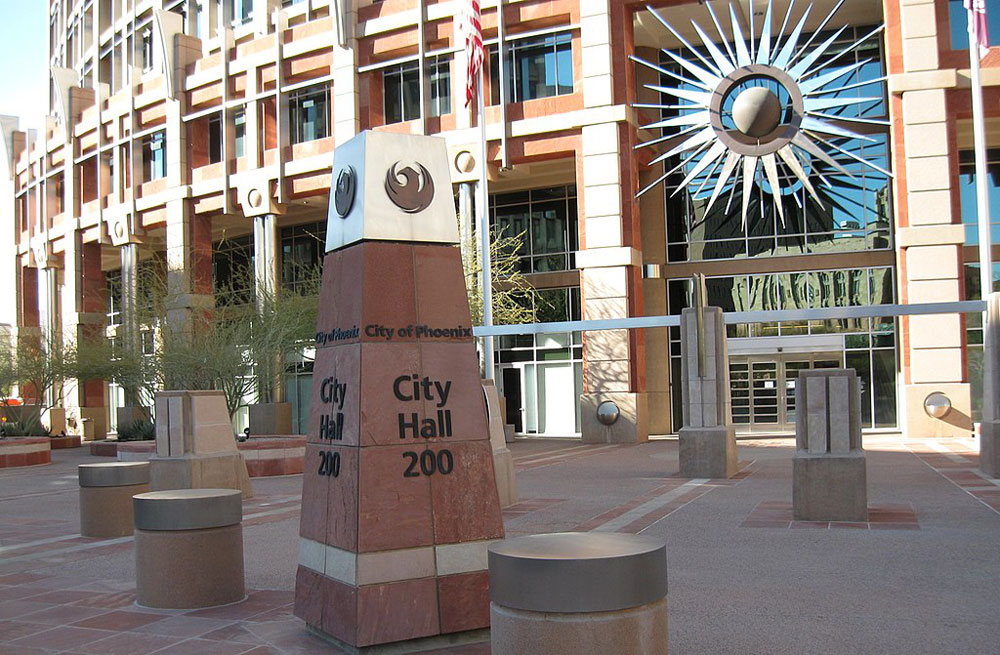
February 27, 2020; Associated Press and ABC15-TV Arizona
As in too many cities, members of Phoenix, Arizona’s police force have found themselves involved in questionable shootings and arrests, often involving black and brown men and women. Easily captured by witnesses with cellphones, these stories go public and spark local protests over violence, racism, and lack of trust in the police. Almost as quickly, other voices, some as powerful as the president and the US attorney general, can be heard defending the actions of law enforcement.
2019 was a particularly violent year in Phoenix, with a record number of police-involved shootings and one non-shooting incident that incited widespread outrage. Community voices called for the creation of an independent citizen review process. Experts were cited backing their perspective that such a process was critically important; as Peter Hammer, a law professor at Wayne State University Law School, put it in comments to an Atlantic reporter last year: “If we are trying to find pathways out of the racialized policing we’re seeing, community oversight is the sort of thing we have to embrace.” On the other hand, police supporters called the effort an overreaction that made policing more dangerous.
With powerful political backers, building effective oversight has been very difficult. Phoenix leaders, as leaders often do, began to study the issue trying to find a way to make everyone happy. That process came to a head at a recent meeting of the Phoenix city council, where Mayor Kate Gallego surprised the audience. On the agenda were two proposals, one put forward by the mayor and the other supported by a newly elected member of the council.
Gallego’s proposal included the creation of an ombudsman position to give community members a channel to voice their concerns. The other option would create a new Office of Accountability and Transparency (OAT), one “separate from the police department,” that would receive and have a role in addressing complaints.
When the Phoenix Police Department opens a professional standards investigation for alleged misconduct, OAT will conduct a parallel investigation, including questioning officers and witnesses. Both the internal and OAT investigators will provide reports with disciplinary recommendations directly to the police chief.
Sign up for our free newsletters
Subscribe to NPQ's newsletters to have our top stories delivered directly to your inbox.
By signing up, you agree to our privacy policy and terms of use, and to receive messages from NPQ and our partners.
Members of the local police union had strong objections, and its president said, “I can say right now that the Phoenix Law Enforcement Association cannot support any model that does not show how the entire Phoenix community, which includes police officers, benefits.” Councilmember Sal DiCiccio, in comments reported by Anita Snow of the Associated Press, said, “This is the most radical, extremist anti-police plan in the whole damn country. It is going to destroy the morale of our police department and put our public in danger.”
But, to its great credit, Phoenix’s council heard dozens of members of the community, giving them leave to speak for almost five hours of the benefits of “a citizen review board with investigative powers.”
Viridiana Hernandez of the nonprofit neighborhood group Poder in Action told council members before the vote that anything less would be “false accountability.” The Rev. Warren H. Stewart Sr. of the First Institutional Baptist Church, an African American house of worship that hosted early meetings studying oversight possibilities, said he supported a citizen review board with investigative powers. While “we respect and support our police…the department, like the community, cannot police itself and needs oversight.”
As the debate went on, Gallego saw that neither proposal would pass, a situation that would please many civic leaders, as it would allow them to study the issue further but take no action. In a moment that spoke of her bravery and her willingness to value segments of her community that are often ignored and find themselves powerless, she changed her position, withdrew her plan, and voted for an approach she had once seen as too hard on her city’s police. While concerns remain about the challenges of putting the other plan to work, she cast the deciding vote in a 5–4 decision to move forward as the community wished and create the Office of Accountability and Transparency.
This is an outcome to be celebrated. It is one moment when those with less power came out on top. Now, their energy and our hopes turn to ensuring the outcomes of the plan match their dreams.—Martin Levine













